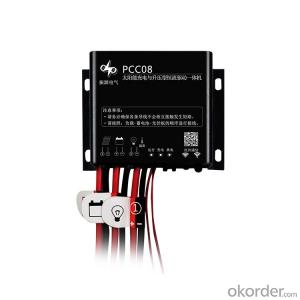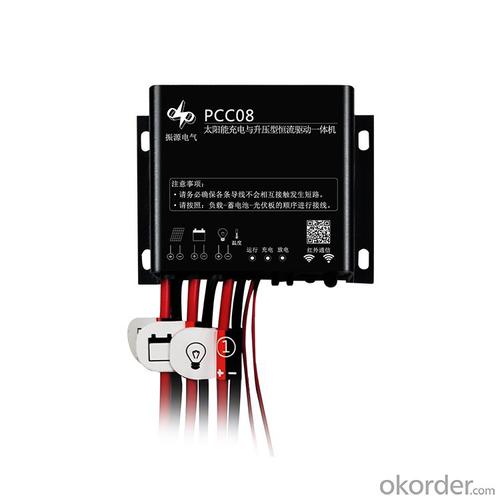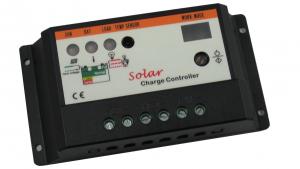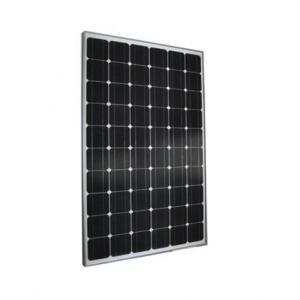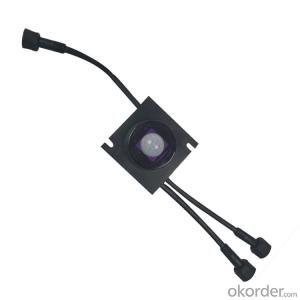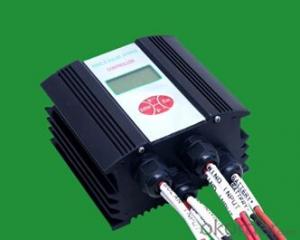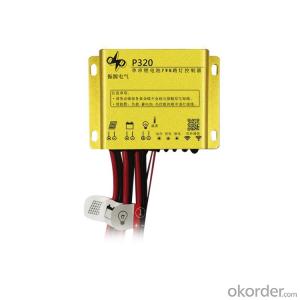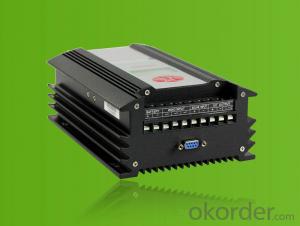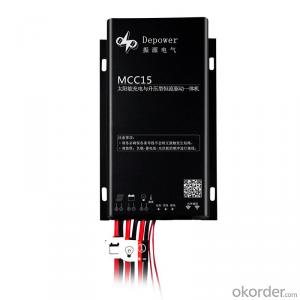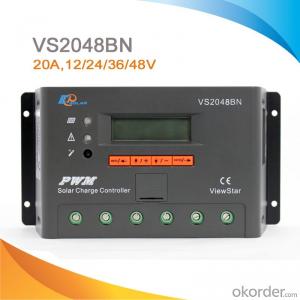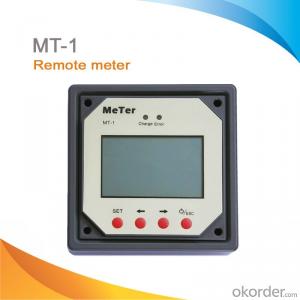Studer Solar Controllers IP68 PCC08 8A 12V PWM Solar Charger Controller for Solar Street Light
- Loading Port:
- China main port
- Payment Terms:
- TT OR LC
- Min Order Qty:
- 1 pc
- Supply Capability:
- 1000 pc/month
OKorder Service Pledge
OKorder Financial Service
You Might Also Like
1.Features :
*Professional design to promote system reliability
-Using international well-know brand semiconductor device.
- High LED driving, significantly reduce the product temperature.
- IP68 protection degree without any buttons, further improve the waterproof reliability.
*Discharge efficiency
- LED constant current drive efficiency up to 96%
-Dimming LED constant current drive efficiency from 91%-96%
*Minimal power consumption
-The current consumption ≤10mA
*Intelligent battery management
-It is PWM and CV charge, which matches with Li protect board perfectly.
- Significantly extends the battery lifetime up to 50% base on intelligent temperature
compensation charge and discharge management.
- Intelligent energy management of battery ensures that the battery charge & discharge in
shallow state which significantly extend the battery life.
*Intelligent LED drive management
- Light control function, automatic lights LED in the dark, turn off automatically at dawn
- Constant current drive
- three times control.
- Delaying infrared body sensor
- Morning lighting
- Dimming function, control to output different power in different typical time.
*Flexible parameter set
- Excellent man-machine interface, convenient operation.
- Infrared wireless communications, connecting with a handheld remote control for easy installation.
*Protect function
- Battery and the solar panel reverse connection protection.
- To prevent the battery discharge to the solar panel .
- Battery low voltage disconnect and reconnect voltage protection.
-The LED output short and open circuit protection.
2. Technical parameter
Model | PCC08 G4 |
System voltage | 12V |
Output power | 40W/12 V |
Static power consumption | 13 mA/12 V |
Rated charging current | 8 A |
Solar panel power | ≤ 120 W |
Solar panel open-circuit voltage | < 25 V |
MPPT tracking efficiency | 96% |
Typical constant current source efficiency | 90% to 96% |
Overvoltage protection | Overcharge voltage 2 V |
Charging voltage limit | Overcharge voltage 1 V |
Current accuracy | ±3% |
Over-temperature protection | 85 °C |
Light control voltage | 16 V ~50 V |
Operating temperature | -35 °C ~+60 °C |
Protection degree | IP68 |
Weight | 180g |
Dimensions (mm) | 58*82*23.5 |
3. Images
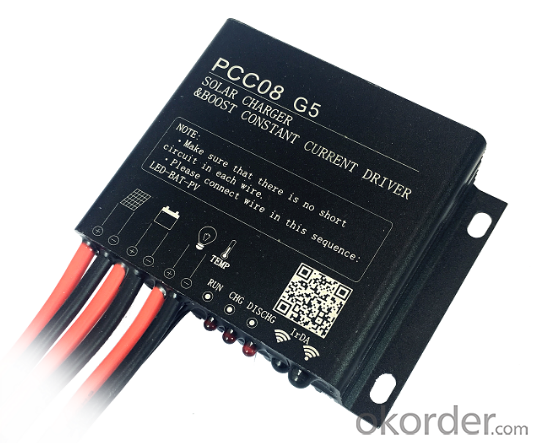
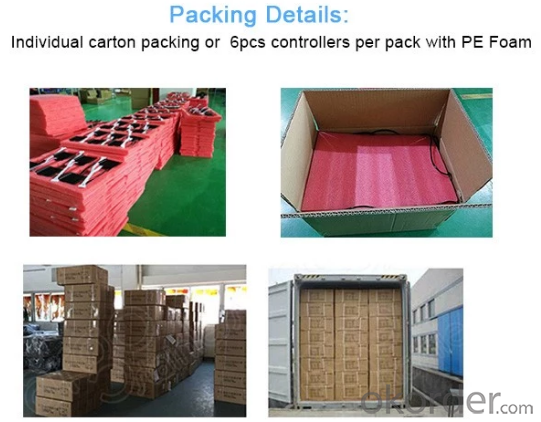
4.FAQ
Q: DO YOU HAVE ANY CERTIFICATION FOR YOUR PRODUCTS?
A: We have ISO9001:2015, CE、 RoHS certifications for all of our products.
Q: DO YOU HAVE MOQ FOR PLACE ORDER?
A: Low MOQ, 1pe for sample checking is available.
- Q: Can a solar controller be used with solar-powered indoor security systems?
- Yes, a solar controller can be used with solar-powered indoor security systems. A solar controller is responsible for managing and regulating the power coming from the solar panels to the connected devices or batteries. In the case of solar-powered indoor security systems, a solar controller can be used to ensure that the solar panels generate enough power to keep the security system running efficiently. The solar controller will monitor the power output from the panels and adjust the voltage and current to match the requirements of the security system. This ensures that the system receives a steady and reliable power supply, even during periods of low sunlight or fluctuating weather conditions. So, by using a solar controller, solar-powered indoor security systems can operate effectively and provide continuous surveillance without the need for external power sources.
- Q: Can a solar controller be used with solar-powered camping equipment?
- Yes, a solar controller can be used with solar-powered camping equipment. A solar controller helps regulate the flow of electricity from the solar panels to the camping equipment, ensuring efficient charging and preventing overcharging or damage to the equipment's batteries.
- Q: Can a solar controller be used with a solar-powered water purification system?
- Yes, a solar controller can be used with a solar-powered water purification system. A solar controller is responsible for regulating the amount of power being generated by solar panels and ensuring that it is optimized for the system's needs. In a solar-powered water purification system, the solar controller would help manage the power supply to the purification components, such as pumps or filters, ensuring efficient operation and maximizing the use of solar energy.
- Q: Can a solar controller be used in a mobile solar power system, such as an RV or boat?
- Yes, a solar controller can definitely be used in a mobile solar power system such as an RV or boat. In fact, it is highly recommended to use a solar controller in such systems to ensure efficient and safe charging of the batteries. A solar controller, also known as a charge controller, is designed to regulate the flow of solar energy from the solar panels to the batteries. Its main purpose is to prevent overcharging and over-discharging of the batteries, which can lead to damage and reduce their lifespan. In a mobile solar power system like an RV or boat, where the solar panels are exposed to varying sunlight conditions and the batteries are constantly being charged and used, a solar controller becomes even more important. It helps optimize the charging process by adjusting the voltage and current to match the battery's requirements, thereby maximizing the charging efficiency. Furthermore, a good quality solar controller will also have additional features like temperature compensation and load control. Temperature compensation ensures that the charging parameters are adjusted based on the ambient temperature, which helps prevent any potential damage to the batteries. Load control allows you to connect additional loads to the system, such as lights or appliances, and ensures that they are powered directly from the solar panels without draining the batteries. In summary, a solar controller is an essential component in a mobile solar power system like an RV or boat. It helps regulate the charging process, protects the batteries, and maximizes the efficiency of the solar energy utilization.
- Q: Can a solar controller be used with a solar-powered airport or seaport?
- Yes, a solar controller can be used with a solar-powered airport or seaport. A solar controller is an essential component of a solar power system as it regulates the flow of energy from the solar panels to the batteries, ensuring efficient charging and preventing overcharging. In the case of a solar-powered airport or seaport, a solar controller would play a crucial role in managing the energy generated by the solar panels and storing it in batteries for use during low sunlight or at night, thus helping to maintain uninterrupted power supply to critical infrastructure and operations.
- Q: I installed the force Norit, solar hot water controller on a regular, set, Sheung Shui, three keys, how to set the automatic Sheung Shui!
- Press and hold the water level key for 3 seconds, hear the "drop" sound, the display temperature of the two digits and the "time to add water" indicator light at the same time flashing, repeat the water level key to set the time to add water time. Set the time in Beijing plus the number of hours set into the regular water, such as set at 12 o'clock in the hour, regularly at 8 o'clock every day on the water, set the number of hours 20 (range 00-23), wait 5 seconds to automatically save and exit the "regular water" indicator light is on, the regular water function takes effect, after 8 o'clock every day will start the regular water. To cancel the time to add water: hold the water level key for 3 seconds, hear the "drop" after the "time to add water" indicator off, the time to add water function to cancel.
- Q: What are the types of solar controllers?
- Solar controllers can be divided into three main types: PWM controllers, MPPT controllers, and basic on-off controllers. The most common type is the PWM controller, which is suitable for small to medium-sized solar systems. These controllers regulate the voltage output from the solar panels by rapidly switching the power on and off, thereby maintaining a constant voltage for the battery. In terms of affordability, ease of use, and efficiency, PWM controllers are a good choice for most applications. On the other hand, MPPT controllers are more advanced and efficient compared to PWM controllers. They track the maximum power point of the solar panels by adjusting the voltage and current to match the battery requirements. This feature enables MPPT controllers to extract the maximum amount of power from the solar panels, even in low-light or partially shaded conditions. These controllers are ideal for larger solar systems and can significantly enhance the overall efficiency and power output. For very small solar systems where cost and complexity are major concerns, basic on-off controllers are typically used. These controllers directly connect the solar panels to the battery and disconnect the panels when the battery reaches its full charge to prevent overcharging. Although they are inexpensive, basic on-off controllers offer limited functionality and are not as efficient as PWM or MPPT controllers. Choosing the right solar controller depends on factors such as the size of the solar system, available budget, and desired efficiency. It is crucial to select the appropriate controller to ensure optimal performance and longevity of the solar system.
- Q: Can a solar controller be used in a hybrid solar system?
- Yes, a solar controller can be used in a hybrid solar system. A solar controller, also known as a charge controller, is used to regulate the charging and discharging of batteries in a solar power system. In a hybrid solar system, which combines solar power with another source of energy such as a grid or generator, a solar controller is still necessary to manage the battery charging process. In a hybrid solar system, the solar controller helps optimize the use of solar energy by ensuring that the batteries are charged efficiently from the solar panels. It prevents overcharging, which can damage the batteries, and also prevents deep discharge, which can reduce their lifespan. Additionally, the solar controller can provide additional features such as battery temperature sensing and load control, further enhancing the performance and longevity of the battery bank. By using a solar controller in a hybrid solar system, you can effectively integrate and manage different sources of energy, allowing you to maximize the use of solar power while still having the flexibility to switch to alternative sources when needed. This ensures that your hybrid solar system operates efficiently, effectively utilizing the available resources and providing you with a reliable and sustainable power supply.
- Q: How does a solar controller regulate the charging current?
- The charging current of the solar panel and battery is regulated by a solar controller, which monitors the voltage and current levels. Its purpose is to prevent overcharging of the battery by limiting the current flow when the battery reaches its maximum voltage. To achieve this regulation, the controller employs either pulse width modulation (PWM) or maximum power point tracking (MPPT) techniques. In a PWM solar controller, the controller controls the average charging current by rapidly turning the solar panel's current on and off. When the battery voltage is low, the controller allows a maximum charging current, which gradually decreases as the battery voltage rises. This prevents overcharging and damage to the battery. On the other hand, an MPPT solar controller utilizes a more advanced algorithm to continuously track the maximum power point (MPP) of the solar panel. The MPP represents the optimal voltage and current combination at which the solar panel can deliver its maximum power output. The controller adjusts the charging current accordingly to ensure that the panel operates at its MPP, resulting in maximum power transfer to the battery. Both PWM and MPPT controllers are efficient in regulating the charging current, thus preventing overcharging and extending the battery's lifespan. The choice between the two depends on factors such as the characteristics of the solar panel, battery type, and system requirements.
- Q: Can a solar controller be used with different types of solar panel shading systems?
- Different types of solar panel shading systems can be used with a solar controller. The primary purpose of a solar controller is to control the flow of electricity between the solar panels and the battery or grid. It is not reliant on the particular type of solar panel shading system in use. Regardless of whether you have a fixed tilt, single-axis, or dual-axis solar panel shading system, a solar controller can be used to maximize energy generation and prevent overcharging of the batteries. However, it is crucial to verify that the solar controller is suitable for the voltage and current requirements of your specific solar panel system.
Send your message to us
Studer Solar Controllers IP68 PCC08 8A 12V PWM Solar Charger Controller for Solar Street Light
- Loading Port:
- China main port
- Payment Terms:
- TT OR LC
- Min Order Qty:
- 1 pc
- Supply Capability:
- 1000 pc/month
OKorder Service Pledge
OKorder Financial Service
Similar products
Hot products
Hot Searches
Related keywords
